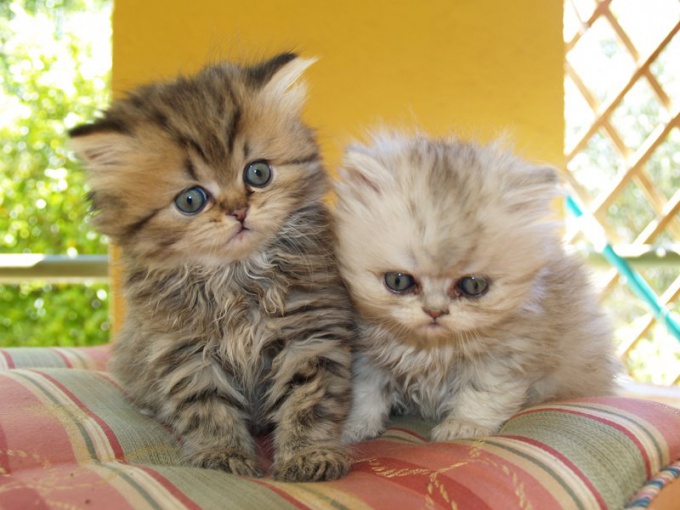Instruction
1
As a rule, the kittens convey to new owners at the age of 9-12 weeks. By acquiring a small "Persian", get the owner all the information about the diet and follow all regulations. Avoid abrupt change in diet. Separation from mother, brothers and sisters, with a familiar environment is already stressful for a kitten. This period is added the risk of infectious diseases related to the fact that the body of the baby ceases to receive from his mother the necessary antibodies. In this situation it is necessary to ensure the kitten is particularly meticulous care.
2
Until your kitten will not be 4 months, you must maintain five times a day feeding regime. By the sixth month – to reduce the number of feedings to three, keeping the normal daily diet. Three-month kitten should consume about 170g of food a day (5 feedings in 3 hours), four-month – about 200g of food (4 feeding after 3-4 hours), a five-month – 200g of food (3 feeding in 6 hours). Go to twice-a-day feeding regime it is possible to achieve a pet one year.
3
Daily kitten diet should consist of two-thirds meat and one third of the garnish (porridge, cottage cheese and boiled vegetables). You can use lean meat (beef, lamb, rabbit) and boiled sea fish (not more than one or two times a week). One or two times a week one serving of meat can be replaced with offal (liver, kidney, heart).
A serving of dairy food may consist of brewed of wheat or oatmeal. Cereals contain carbohydrates that are needed for kittens in small quantities. Instead of cow's milk is better to use a water-dissolved powdered milk. The ideal option is goat's milk.
The approximate balance of daily servings of food the kitten:
• 100-120g of meat;
• 20-30g of breast food;
• 10-20g of cereals;
• 20-30g of vegetables.
One or two times a week the kitten can offer half of boiled egg yolk, which contains the necessary animal vitamin E (Biotin).
A serving of dairy food may consist of brewed of wheat or oatmeal. Cereals contain carbohydrates that are needed for kittens in small quantities. Instead of cow's milk is better to use a water-dissolved powdered milk. The ideal option is goat's milk.
The approximate balance of daily servings of food the kitten:
• 100-120g of meat;
• 20-30g of breast food;
• 10-20g of cereals;
• 20-30g of vegetables.
One or two times a week the kitten can offer half of boiled egg yolk, which contains the necessary animal vitamin E (Biotin).
4
You need to give small "Persian" from mineral supplements and medications, contribute to the strengthening of the skeleton and growth. Persian cats do need taurine. This amino acid is found in foods of animal origin, and its lack leads to heart disease, blindness and reproductive problems. But still, before using vitamins for cats should consult a veterinarian.
Vitamin needs can partially be met by adding to the food plant oil, and well crushed, added to the feed of vegetables (carrots, cauliflower, parsley). They can mince together with meat or boiled fish.
Vitamin needs can partially be met by adding to the food plant oil, and well crushed, added to the feed of vegetables (carrots, cauliflower, parsley). They can mince together with meat or boiled fish.
5
In pet stores, there are now lots of ready made balanced feed for cats, both dry and canned. Feed manufacturers do not approve of mixed feeding (canned food with dry food). Dry food for kittens easy on the road, they do not deteriorate and leave a clean kurnosau Persian face. Canned – good for small kittens with weak dentition.
Of course, what food to give the kitten to you, but if your choice is still leaning in favor of prepared feeds for kittens, and not a natural food, try to purchase for their little "Persian" feed the higher class. This food is not cheap but is a complete a specialized diet that meets all the needs of a kitten in vitamins, nutrients and minerals. If you give the kitten food is higher class, then he does not need any additional additives. Such foods are very well absorbed – not less than 85% and have no soy protein. Their recipes are developed by nutrition specialists and tested on hundreds of animals. In addition, the feed of the highest class do not contain artificial flavors, but very tasty and kittens with great pleasure eat them. Feeding recommendations are typically listed on the packaging with the food.
Of course, what food to give the kitten to you, but if your choice is still leaning in favor of prepared feeds for kittens, and not a natural food, try to purchase for their little "Persian" feed the higher class. This food is not cheap but is a complete a specialized diet that meets all the needs of a kitten in vitamins, nutrients and minerals. If you give the kitten food is higher class, then he does not need any additional additives. Such foods are very well absorbed – not less than 85% and have no soy protein. Their recipes are developed by nutrition specialists and tested on hundreds of animals. In addition, the feed of the highest class do not contain artificial flavors, but very tasty and kittens with great pleasure eat them. Feeding recommendations are typically listed on the packaging with the food.
